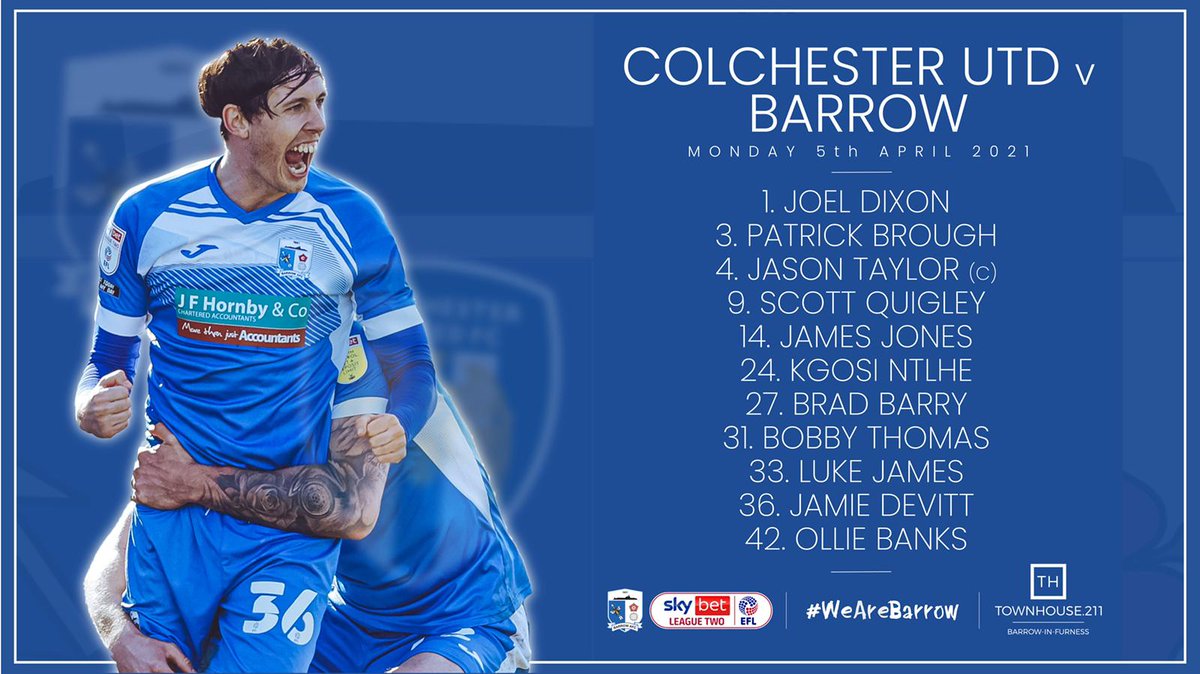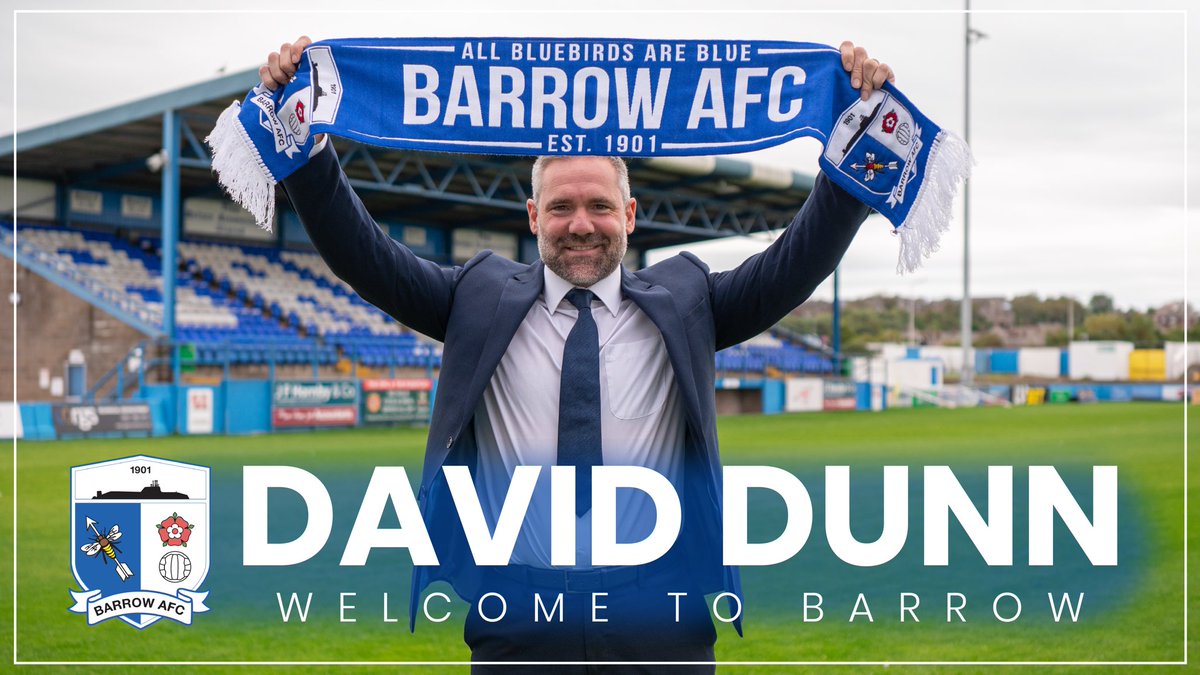Barrow Afc Twitter Login

Hard work and sound management have taken Barrow AFCback up to the Football League after nearly 50 years. Flagship club of rugby town Barrow-in-Furness on the bleak Cumbrian coast, Barrow overcame numerous hazards in the non-league wilderness, nearly going under completely in 1999. Their ground, Holker Street, also remains in place, and now goes under the name of the Progression Solicitors Stadium.
The history of Barrow AFC, formed in 1901, can be easily divided into two half-centuries. The first came after World War I, when the Bluebirds were founding members of the Third Division North – the second, post-relegation in 1972, involves nearly five decades in the fifth and sixth tiers.
High points and heroes can be ascertained from names around the stadium. Defender Brian Arrowsmith, who made a record 512 appearances for the club from the early 1960s onwards, has the main stand named after him. A mainstay of the side under player-manager Colin Appleton that gained promotion from the Fourth Division in 1967, Arrowsmith also coached Barrow in 1974-75. Then there’s the stand opposite, named after David Wilkie, whose five-year tenure as manager saw the club win the FA Trophy in 1990 in front of nearly 20,000 at Wembley. There is, of course, an FA Trophy room at Holker Street.
Send private message Twitter. Re: Barrow AFC Squad 2019/20. Quote; Post by TaylorBAFC » Mon May 20, 2019 8:15 pm. Return to “Barrow AFC”. For all things Barrow AFC. Keep discussions civil and fair, we're all Barrow aren't we! Topics: 6267 Posts: 193095 Last post Re: Safe by Matty View the latest post.
Wilkie, who also led the Bluebirds to the Northern Premier League title in 1989 and a narrow defeat to Bolton Wanderers in the FA Cup Third Round of 1991, died a year later, only 56. The road lining the northern, Crossbar End of the ground, also takes his name.

You’ll see no mention of Stephen Vaughan, however, despite his significant investment in the club and its ground in the mid-1990s. A boxing promoter with underworld connections, Vaughan had funded the building of the main, all-seater stand, and brought in the right players for Barrow to reach the fifth-tier Conference in 1998.
The Bluebirds lasted only one season before Vaughan vanished, taking his financial support with him. Opaque ownership of both club and stadium clouded operations until 2003, when a members’ company took over the reins. Occasional forays in the FA Cup – a narrow defeat to Gareth Southgate’s Middlesbrough in front of a 25,000 crowd in 2009 stands out – allowed Barrow to stay afloat and regain Conference status that same year.
Winning another FA Trophy in 2010, the only club to do so at the new and old Wembley Stadiums, Barrow welcomed the arrival of locally born Dallas-based businessman Paul Casson as owner in 2014 – and, equally significantly, Ian Evatt as player-manager before the 2018-19 season. Halfway through his first, promising campaign, and with Casson’s investments slowly paying off, the emigré entrepreneur surprisingly passed ownership to club director Paul Hornby.
In a first move that would set the tone right up to promotion in 2020, Hornby’s quickly held a Q&A session with supporters in the Crossbar bar at Holker Street. From 2018 on, the Bluebird Supporters’ Trust hold a ten percent stake in the club, now run by a locally based consortium. With goals from John Rooney, younger brother of Wayne, and Scott Quigley, Evatt’s motivated side cantered ahead in the fifth-tier National League.
Elected champions after the season was suspended in March 2020, Barrow may have envisaged a different scenario for their long-awaited return to the Football League but the result was no less sweet – although tempered by the news that club legend Brian Arrowsmith had died from the Covid-19 virus on Easter Sunday. Evatt’s achievements then lured him to Bolton, ex-Blackburn star David Dunn stepping into the managerial seat at Holker Street.
In a strange twist to their triumphant league return, Barrow will face Bolton, giving the Bluebirds a chance to take on their outgoing manager’s new team, 30 years after their tight struggle in the FA Cup.
Stadium
Barrow Afc Twitter Live
Charmingly old-school, Holker Street, aka the Progression Solicitors Stadium, has only changed in increments since first hosting football at the turn of the last century. Rented from adjoining Furness Railway by Barrow from 1909 on, it received its first stand in 1912 and covered terracing a decade later.
Barrow Afc Twitter Account
Floodlights arrived in the early 1960s plus, as Barrow struggled to make ends meet, a speedway track in the early 1970s, an addition that failed to endear the club to the re-election committee in 1972. The main stand you see today, named after stalwart defender Brian Arrowsmith, wasn’t built until the later 1990s yet still feels quaint, only covering half the pitch either side of the halfway line, leaving room for standing areas. Covered and seated, it holds around 1,000, a fifth of the overall capacity.
The rest of the ground is for standing spectators, the partly covered Ray Wilkie Popular Terrace opposite the main stand, and the covered Holker Street Terrace behind the east goal. This is partly given over to away fans, who are now also allocated seats in the main stand alongside these standing supporters from the visiting team. Behind the opposite goal stands the Crossbar clubhouse – hence the Crossbar End – and offices, and can only accommodate a few standing fans. With average gates around 2,000 in 2019-20, Barrow’s most successful season for decades, the only time when capacity will be tested will be for a glamorous cup tie – derbies with Workington are a thing of the past.
Transport
Holker Street runs parallel to the railway, a 7-8min walk from Barrow-in-Furness station – turn right as you exit, you’ll see the floodlights in the semi-distance. Every 15mins and every hour after 6pm, the No.3 bus stops at the station and takes 2mins to reach the Barrow FC for Asda stop, Mon-Sat service only.

The sat nav code for Holker Street is LA14 5UW. There is parking on the Asda side of the ground by Barrow & District Car Repairs at £2 per vehicle.
Tickets
Tickets are distributed from the main reception (Mon-Fri 9am-4pm) at the stadium and the match-day outlet alongside, cash and cards accepted. Away fans should arrange purchase through their own club – some tickets may be available at reception. Email office@barrowafc.com for details. There are also online saleshere. Admission is £16 to stand, £19 to sit, discounted at £13/£15 and £5/£6 for under-18s.
Shop
The club shop (Mon-Fri 9am-4pm, match-day Tue until 7.45pm, match-day Sat noon-3pm) by reception stocks first-team tops, a jazzy white piping offsetting the traditional blue for 2020-21, and away kits of yellow and black. Coasters, mugs and badges feature the club badge of a submarine, the red rose of Lancashire and, naturally, a bee and arrow.
Bars
Barrow Afc Twitter Football
The main drinking spots are within and alongside the ground, starting with the Soccer Bar behind the Crossbar end, a cabin-cum-function room with pool, snooker and a dartboard, standard beers and a friendly clientele. Likewise, the Crossbar itself, in the clubhouse behind this west goal, usually welcomes away fans and screens sport. Prices are attractively low, with cider sold by the pitcher.

